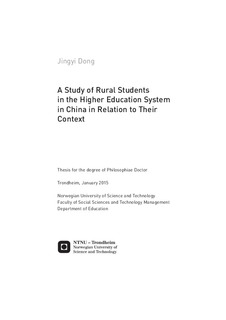| dc.description.abstract | Rural students constitute the majority of the student body in the Chinese higher education system. However, there is far too little scientific research on this large group of students. This study attempts to make a research breakthrough by contextualizing the rural students in relation to both the present situation and underlying historical conditions. The study attempts to shed light on both the macro and the micro levels, looking into both objective and subjective aspects, and thus presenting a dynamic and panoramic picture. The general framework of the study focuses on the relation between the state, rural society and university.
The research approach uses several theories, including Bourdieu's theory of field, which is applied both to construct a major theoretical and conceptual framework and to function as an instrument of analysis. By examining social relations between objective positions, the focus can be placed on the rural people, regardless of their geographical location, and it is possible to detect the heterogeneous forces that are undermining the university. In analysing the situation in rural China, Galtung's theory of structural and cultural violence and Lindner’s theory of human dignity and humiliation were relevant in the analysis of how objective structures may influence the mental structure of the rural people. Both Galtung’s and Lindner’s theories complement Bourdieu's theory. Maassen and Cloete’s analytical triangle, which links the state, university and society, provides a framework for the studies included in the thesis. Aided by the approach of grounded theory, the empirical data material obtained from the rural students is presented for analysis.
Ultimately, the research leads to such findings as: urban-rural segregation and the heteronomy of the university may be decisive factors that have forced the rural students into a disadvantaged position. A more fundamental reason for this may be that the state, supported by urban-rural segregation, has firm control over the university and society and has managed to reproduce the existing pattern of power relations through higher education. | |
